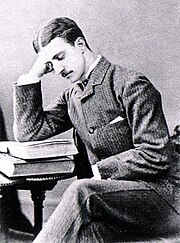Montague John Druitt
| Montague Druitt | |
|---|---|

c. 1879
|
|
| Born |
15 August 1857 Wimborne Minster, Dorset, England |
| Died | Early December 1888 (aged 31) |
| Body discovered | River Thames, near Thornycroft's torpedo works, Chiswick, on 31 December 1888 |
| Resting place | Wimborne cemetery |
| Education | B.A. in Classics |
| Alma mater |
New College, Oxford Inner Temple |
| Occupation | Teacher and barrister |
| Employer | George Valentine's school, Blackheath |
| Known for | Suspect in the Jack the Ripper murders |
| Parent(s) | William and Ann Druitt |
| Relatives | Six brothers and sisters: William, Arthur, Edward, Georgiana, Edith, and Ethel |
Montague John Druitt (15 August 1857 – early December 1888) was one of the suspects in the Jack the Ripper murders that took place in London between August and November 1888.
He came from an upper-middle class English background, and studied at Winchester College and the University of Oxford. After graduating, he was employed as an assistant schoolmaster at a boarding school and pursued a parallel career in the law, qualifying as a barrister in 1885. His main interest outside work was cricket, which he played with many leading players of the time, including Lord Harris and Francis Lacey.
In November 1888, he lost his post at the school for reasons that remain unclear. One month later his body was discovered drowned in the River Thames. His death, which was found to be a suicide, roughly coincided with the end of the murders attributed to Jack the Ripper. Private suggestions in the 1890s that he could have committed the crimes became public knowledge in the 1960s, and led to the publication of books that proposed him as the murderer. The evidence against him was entirely circumstantial, however, and many writers from the 1970s onwards have rejected him as a likely suspect.
Druitt was born in Wimborne Minster, Dorset, England. He was the second son and third child of prominent local surgeon William Druitt, and his wife Ann (née Harvey). William Druitt was a justice of the peace, a governor of the local grammar school, and a regular worshipper at the local Anglican church, the Minster. Six weeks after his birth, Montague Druitt was christened at the Minster by his maternal great-uncle, Reverend William Mayo. The Druitts lived at Westfield House, which was the largest house in the town, and set in its own grounds with stables and servants' cottages. Druitt had six brothers and sisters, including an elder brother William who entered the law, and a younger brother Edward who joined the Royal Engineers.
...
Wikipedia
